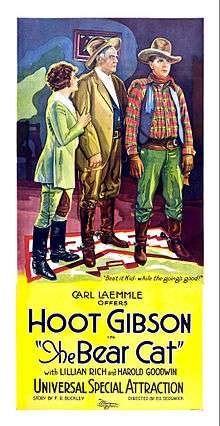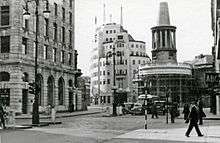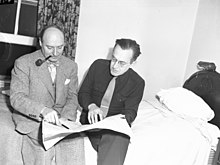Frederick Robert Buckley
Frederick Robert Buckley (1896–1976), better known as F. R. Buckley, was an English writer. He wrote more than 200 short stories for pulp magazines between 1918 and 1953.[1] He was born on 20 December 1896 in Colton, Staffordshire, England, died 1976.[2] He was the son of Robert John Buckley (1847–1938) and Mary (Wakelin) Buckley. His father was music critic for the Birmingham Gazette from 1886–1926.[3] Frederick attended King Edward's School, Birmingham and Birmingham University, studying journalism.[4] While at King Edward's School, at age 14, he performed in Aristophanes' Peace in the role of Theoria. Also in the cast was schoolmate J. R. R. Tolkien playing Hermes.[5] F. R. Buckley was married in 1916 to actress Helen Curry and his brother-in-law was fellow pulp fiction author Tom Curry.[4]
Frederick Robert Buckley | |
|---|---|
| Born | 20 December 1896 Colton, Staffordshire, England |
| Died | June 1976 |
| Occupation | Writer screenwriter radio presenter film critic actor |
| Years active | 1917–1972 |
| Spouse(s) | |
Silent film era
_-_8.jpg)
In 1915, Buckley emigrated to the United States on the SS St. Louis[6] and worked as a film critic for the Motion Picture Mail, a Saturday magazine supplement of The New York Evening Mail. Starting in 1917, he worked in silent film in Brooklyn for the Vitagraph Studios where he was primarily a screenwriter and occasionally an actor.[4] Between 1917 ands 1918 he wrote, co-wrote or adapted the scenarios for The Cambric Mask, By the World Forgot, A Gentleman's Agreement, The Purple Dress, Lost on Dress Parade, The Song of the Soul, The Other Man, The Hiding of Black Bill,[7] A Night in New Arabia, The Last of the Troubadours and The Lovers' Knot. He appeared in principal roles in The Undercurrent and The Unknown Quantity.[2]
Writer
| External images | |
|---|---|

Buckley left Vitagraph after selling Getting It, his first short story to The Black Cat, an American magazine specializing in original short stories of an unusual nature[8] for $20.00.[9]
In 1922 he won the O' Henry Prize for his short story Gold-Mounted Guns published in Red Book Magazine, March 1922.[10] His fiction also appeared in Collier's, Liberty, McClure's, Ellery Queen's Mystery Magazine, and The Saturday Evening Post. Buckley was also extensively published in many pulp magazines including Adventure, Hutchinson's Adventure-story Magazine, Argosy, The Blue Book Magazine, Short Stories , The Story-Teller and Western Story Magazine.[1] For Adventure, Buckley wrote a series of stories set in the Italian Renaissance, revolving around the swashbuckling exploits of condottieri Captain Luigi Caradosso.[11] The Luigi Caradosso stories were enormously popular with Adventure's readers. When Adventure published a new Caradosso story in the May 1940 issue (after a six-year hiatus), the editor Howard Bloomfield noted that many readers had written in to request that the magazine "Bring back Captain Caradosso." [11] Buckley also wrote a novel, The Way of Sinners, set in sixteenth century Italy, in which Caradosso is mentioned. Buckley also published Western, mystery and sea stories as well as historical fiction.[11] Later some of his short stories would be adapted for film or radio by others. The Bearcat, a 1922 Universal Film Manufacturing Company picture, Peg Leg and the Kidnapper, originally published in Western Story Magazine was used for the 1926 Fox Film Corporation film The Gentle Cyclone and RKO Radio Pictures Stung 1931.[2] His story Habit, honorably mentioned in the O'Henry Memorial Volume for 1923.[12] and published in the April 30, 1923 issue of Adventure was adapted for the July 18, 1948 episode of the CBS radio program Escape.[13]
In the 1930s he returned to England writing film criticism again, now for the Birmingham Evening Despatch.
Broadcaster

He was a writer and on air radio presenter on the BBC from 1934–1970.[14][11]
Some time between 1947 and 1951 Buckley is credited with bringing actor and comedian Stanley Unwin to the attention of BBC producers Peter Cairns and David Martin who premiered Unwins first broadcast on the radio program Pat Dixon's Mirror of the Month[15] In the mid-1950s, Buckley worked as a portrait painter in Paris.[11]
From 1959 to 1962 Buckley was heard as a regular panelist on the weekly BBC radio program The Guilty Party where a crime play was dramatized, then the panelists would cross-examine the characters in an effort to figure out who was guilty of the crime.[16]
Later life
From the 1960s to the time of his death in 1976, Buckley lived in a reportedly haunted (though not very enthusiastically according to Buckley[17]) historical house in King's Lynn, Norfolk, which is known as The Exorcist's house.[18]
Books by F. R. Buckley

- 1923 – Canyon of Green Death
- 1925 – Joan Of The Ranch
- 1925 – The Sage Hen [19]
- 1926 – Billy Van
- 1926 – The Blithe Sheriff
- 1927 – The Way of Sinners – In this gory tale of Renaissance Italy, Francesco Vitali, Captain of a formidable band of mercenaries, tells his life story.
- 1927 – Re-enter the Blithe Sheriff
- 1944 – Davey Jones, I Love You
References
- "F. R. Buckley". The FictionMags Index.
- Edward Winter, Who Was R.J. Buckley Chess Story 2004
- F. R. Buckley, Swashbuckling Author PulpFlakes
- The Tolkien Gallery , Library of Birmingham
- Passenger List, American Line, SS St. Louis, 29 May 1915 Gjenvick-Gjonvik Archives
- Rainey, Buck (1996). "Other Writers of the West". The Reel Cowboy: Essays on the Myth in Movies and Literature. Jefferson, NC: McFarland & Company, Inc. p. 115. ISBN 0-7864-0106-0.
- Frank Luther Mott. A History of American Magazines: 1885-1905. Harvard University Press, 1957 (pp.429-31)
- The Editor The Journal of Information for Literary Workers, vol. 56, no. 13, April, 1922, p.101
- "O. Henry Memorial Prize Stories, 1922". Oakland Tribune. Oakland, CA. 22 April 1923. p. 4-W. Retrieved 27 September 2019.
- Frank D. McSherry, Jr., "Captain of Adventure: Luigi Caradosso" in Pulp Vault magazine, #6, November 1989. Tattered Pages Press, (pp .9-16)
- Wireless Age: The Radio Magazine, October 1924, p. 30
- CBS Radio's Escape July 18, 1948 Escape and Suspense! Vintage Radio, a website devoted to the enjoyment of the long-running CBS radio show Suspense and its sister show Escape.
- F. R. Buckley BBC Genome Radio Times
- Actyup in spotlighty The World of Stanley Unwin
- BBC Radio's 'The Guilty Party' Times Past Old Time Radio
- Harper, John (2010). Tales of the Supernatural: Ghost Chronicles. F+W Media, Inc. ISBN 978-1-4463-5005-8. Retrieved 11 December 2019.
- Alison Gifford, KL Magazine, October 2016 The Perfect Local Ghost Story For Halloween pg 22-24
- Geoffrey D. Smith ed. American Fiction, 1901-1925: A Bibliography (Cambridge University Press) 1997, p. 93
External links
- "F. R. Buckley", BBC Genome - Radio Times 1923 - 2009
- A Celebration of Midsummer, 1966 – East Anglian Film Archives
- On Camera: The Stansfield Horror, 1972 – East Anglian Film Archives
- F. R. Buckley, The Author and the Draft: Is Writing Useful?, The Authors League Bulletin, January 1918, Vol. V, No. 10 p. 8
- F. R. Buckley, Be Yourself, Collier's Weekly, June 8, 1929, pp 10–11 at unz.org
- F. R. Buckley, Childhood of Miss Churt, Collier's Weekly July 27, 1940, pp-22-23 at unz.org
- F. R. Buckley works at the Internet Archive
- Buckley, F. R. (1923). "Gold-Mounted Guns". O Henry Memorial Award Prize Stories of 1922. Garden City, NY: Doubleday, Page & Co.: 36. Retrieved 20 December 2019.